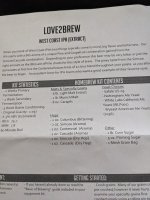Hey guys,
I am brewing my very first all grain batch on Sunday and ran to a brew shop an hour away to get a few last minute supplies. While I was in there, I saw they had in-house recipe kits so I figured I'd pick one up and save myself the shipping cost for my next batch of beer. After I got home and opened it up, I realized the kit was extract.. the packaging did not make it obvious.
Now that I am switching to all grain, I don't want to go backwards and make an extract batch. I figured I'd use all of the other ingredients in this kit, except for the 6 lb's of DME, and figure out what kind of grains to get to make the recipe work. It did come with a small amount of grains that I am thinking I can use. Can anyone recommend a grain combo? The kit is for a west coast IPA
Here's what came with the kit that I am trying to make an all grain recipe from:
Malts/grains
6 lbs DME
1 lb Munich malt
8 oz Carapils
Hops
2 oz colombus
2 oz simcoe
1 oz centennial
1 oz cascade
2 oz simcoe+cascade for dry hopping
Yeast
Safale US-o5
Other
1 lb corn sugar
I am brewing my very first all grain batch on Sunday and ran to a brew shop an hour away to get a few last minute supplies. While I was in there, I saw they had in-house recipe kits so I figured I'd pick one up and save myself the shipping cost for my next batch of beer. After I got home and opened it up, I realized the kit was extract.. the packaging did not make it obvious.
Now that I am switching to all grain, I don't want to go backwards and make an extract batch. I figured I'd use all of the other ingredients in this kit, except for the 6 lb's of DME, and figure out what kind of grains to get to make the recipe work. It did come with a small amount of grains that I am thinking I can use. Can anyone recommend a grain combo? The kit is for a west coast IPA
Here's what came with the kit that I am trying to make an all grain recipe from:
Malts/grains
1 lb Munich malt
8 oz Carapils
Hops
2 oz colombus
2 oz simcoe
1 oz centennial
1 oz cascade
2 oz simcoe+cascade for dry hopping
Yeast
Safale US-o5
Other
1 lb corn sugar
Last edited:

















![Craft A Brew - Safale S-04 Dry Yeast - Fermentis - English Ale Dry Yeast - For English and American Ales and Hard Apple Ciders - Ingredients for Home Brewing - Beer Making Supplies - [1 Pack]](https://m.media-amazon.com/images/I/41fVGNh6JfL._SL500_.jpg)













































